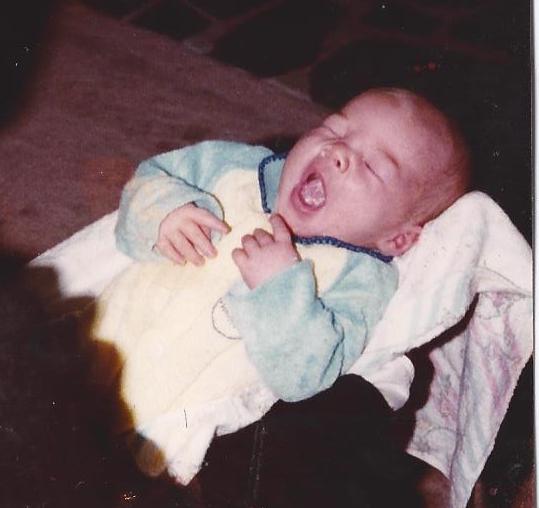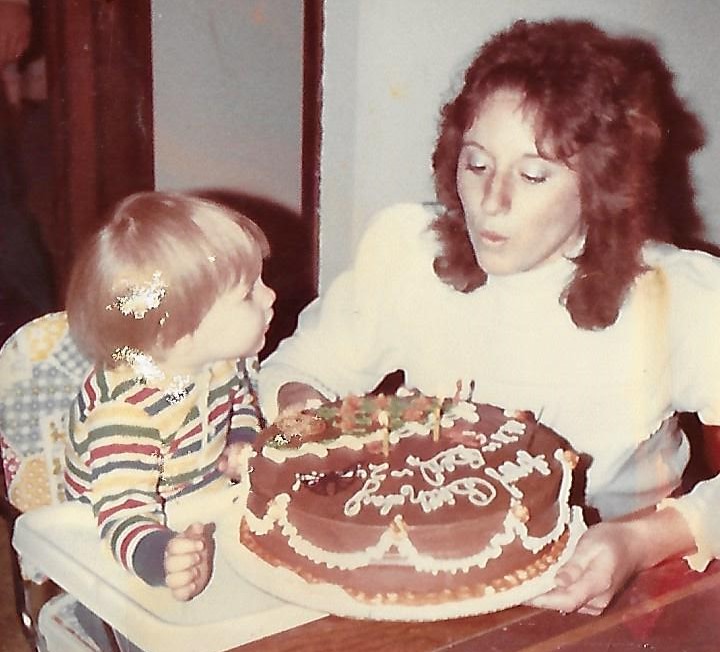Baby Blues
“Princeton-educated and seemingly savvy about all sorts of things, she still never knew that feelings of shame, secrecy, helplessness, and despair — the classic signs of postpartum depression — may affect as many as one in 10 new mothers within six months of delivery, according to the American College of Obstetricians and Gynecologists. More incapacitating than the “baby blues,” postpartum depression is marked by severe sadness or emptiness, withdrawal from family and friends, a strong sense of failure, and even thoughts of suicide. These emotions can begin two or three weeks after birth and can last up to a year or longer if untreated.” Denise Mann “Out of the Blue” on Brooke Shields post partum depression
I didn’t know what hit me. I had no words for it then, in 1981. No one did. I was a healthy 25 year old mom, with a college degree, a nice husband, a beautiful son, a supportive family…and I was in hell.

It didn’t start right away. In those days, your hospital stay was around 3 days or so. The first few days were happy, my parents were thrilled with their first grandchild, my husband was over the moon with happiness, and after a difficult labor, I was excited and proud that I’d gotten through a difficult labor with a healthy 9 pound boy.
Looking back, although I’d never experienced depression before, the triggers were there. Ben was large, overdue, and I had many sleepless nights for a few weeks. I know now that can be just one of the triggers that precede the light going out in my mind.
They also did things differently then. My doctor did not deliver my son, it was someone else in the practice I didn’t know. Perhaps they used an on call system. And, because due dates were less precise then, the practice made the decision that I should be induced.
It began at around 7:30 the morning of October 21st, 1981. I was checked by a nurse, who had orders to put me on what they called a “Pitocin drip”. Nothing much happened for a few hours except for some minor cramping. The nurses weren’t around much, they would just check in about every half an hour and perhaps add more of the pitocin. Around 11, I could feel my waters breaking. And then all hell broke loose, by 11: 30. I was having no breaks between contractions. None. Transition phase of labor is the hardest, but there are some breaks. I had none. I kept telling them that but nothing was done. In those days, doctors were rarely questioned, particularly by women. I just went along with everything. I found this gem of an understatement online, but yes, this is correct. No one stopped or slowed it down. I got so bad, I could barely speak.
Pitocin: Pitocin can cause harder, more frequent contractions than a woman might otherwise have. As can happen in natural labor, very strong contractions might be stressful for the fetus. This may require temporarily stopping the Pitocin.
https://www.southshorehealth.org/wellness/blog/when-your-labor-needs-be-induced
In any case, someone, most likely my husband, asked for help. They let me know they were going to call in an anesthesiologist. But no one came. I heard the nurse saying that they were having trouble locating him.
Eventually, they came back in, sat me up, and shot me full of blessed relief. I had labored so quickly, that they were shocked when they checked me. I was ready for delivery. I could feel nothing. There was no pushing, but an episiotomy was done (meaning a cut). Forceps were used and there he was.
He was perfect and absolutely beautiful. I was in heaven and I was in love at first sight of this robust little thing. The name Ben just fit him perfectly.
But a day or two later, I began to feel odd. I felt out of sync, depressed, agitated. I’d been sad before, as we’ve all been, but this was something far worse. I spoke to a nurse, who cheerfully said, “It’s no big deal, it’s just the “baby blues”. It will go away. I kept telling her that I wasn’t crying, wasn’t sad, this was a different feeling. She again cheerfully said, “You are making a big thing out of nothing. Looking back, although I’m a non violent person, I could have cheerfully strangled her.
It was just last year when I ran across this.
” Synthetic oxytocin (Pitocin) is widely used in obstetric medicine to induce and/or augment labor and reduce post-delivery bleeding. A study published January 30 in Depression and Anxiety now suggests women who receive synthetic oxytocin during childbirth may be more likely to experience postpartum depression or anxiety.”
https://psychnews.psychiatryonline.org/doi/full/10.1176/appi.pn.2017.3a17
I could still look at this beautiful boy with wonder but something had shifted in my brain and the fog wasn’t lifting. And even as I went home, a home I loved, it got darker and darker.

I tried to pretend. It didn’t work. I tried to speak about it. Although everyone loved me, no one knew what to do. I had a hard time being alone. I was beginning to be scared, really scared, that I would feel that way forever. My doctor said it would pass. And, still, it didn’t.
Then a bad thing turned into a stroke of luck. I developed an infection where they had made the cut and had to return to the hospital. I felt relieved as I was barely functioning, and as my husband had to work, I moved into my parents home.\
The infection was handled, but speaking to the doctors and nurses on a general floor I was told that my “baby blues” would pass. Thinking back, I could have cheerfully strangled them too. But finally, we found the right person.
His name was Dr. Brooks. He walked into my room, listened to what I was feeling and said the magic words, “I know what you have and we can treat it”.
To be believed, to be helped, to be understood was a godsend.
It took about 2 1/2 months, but I recovered. I never thought it would happen again.


Thankfully, people are talking about this now. They weren’t in what I refer as the dark ages of mental health awareness almost 40 years ago.

It took 27 years for the next episode to show up. It caught me by surprise and as bad as it was, it did change my life, and for the better.

Leave a Reply